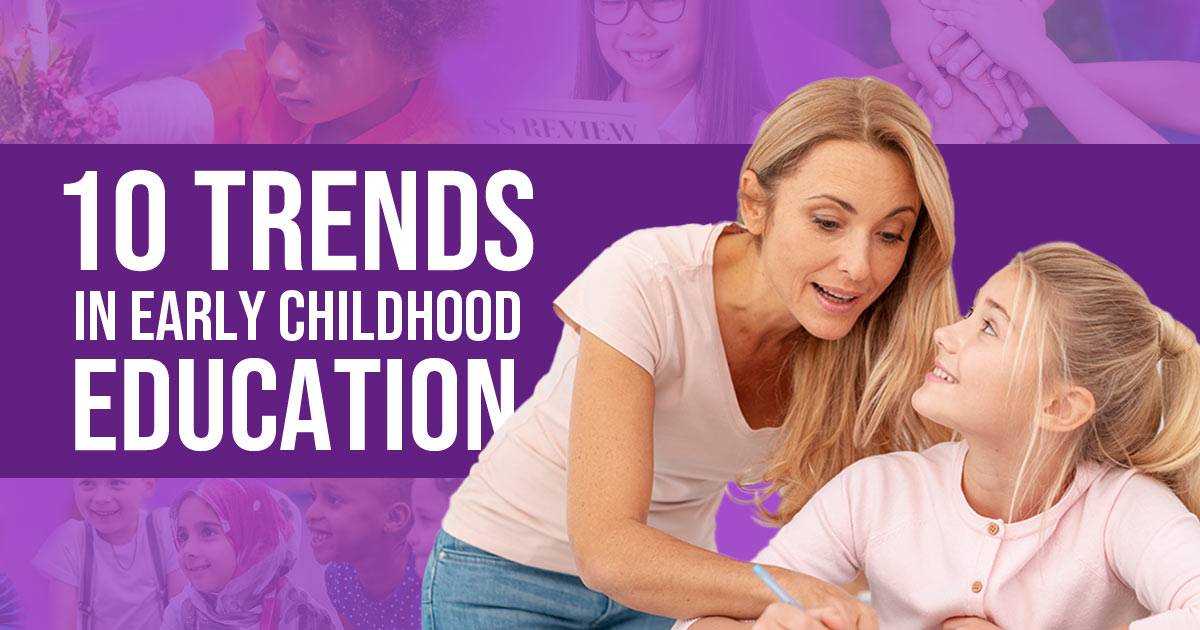10 Trends in Early Childhood Education – Shaping the Future of Learning

Over recent years, early childhood education has undergone a remarkable transformation, underscoring our continuously deepening comprehension of child development and the learning process. In this comprehensive article, we will delve into the profound shifts and developments, commonly referred to as trends in early childhood education, which currently influence how we approach the education and holistic development of our youngest learners.
These trends are not mere fads or passing fancies; they represent a fundamental reevaluation of how we engage with and support children during their formative years. By exploring and understanding these trends, we can better appreciate the intricate tapestry of early childhood education and its crucial role in preparing our children for a constantly evolving future.
Here are the ten current trends in early childhood education, and discuss how these trends shape how we educate and nurture our youngest learners.
1. Embracing Technology in Early Childhood Education
Technology has firmly established itself in early childhood education in the digital age. Educational apps and interactive learning games are increasingly popular tools that actively engage young learners. As one of the early childhood education trends, it’s critical to introduce digital literacy and responsible screen time management into the curriculum, recognizing the impact of technology on the evolving landscape of childhood trends.
2. Holistic Development
Early childhood education now emphasizes holistic development, recognizing the interconnected nature of cognitive, social, emotional, and physical well-being. The holistic approach nurtures well-rounded individuals, focusing on emotional intelligence, physical health, and interpersonal skills. As one of the trends in early childhood education, children are encouraged to explore diverse experiences, catering to their comprehensive growth, thus responding to the broader shift in early childhood education trends.
3. Play-Based Learning
Play-based learning stands at the core of modern early childhood education trends. This idea comes from the thought that kids learn best when they play and explore. This approach provides structured play activities that promote cognitive and social development. It encourages problem-solving skills creativity, and instills a genuine love for learning. Play-based learning acknowledges that children thrive when their natural curiosity and imagination are nurtured, emphasizing a child-centric approach that aligns with the broader landscape of early childhood education.
4. Inclusivity & Diversity
Inclusive education is a cornerstone in the current trends of early childhood education. It’s about creating environments where children of all abilities, backgrounds, and cultures can learn together, promoting empathy and understanding from the earliest age. This trend acknowledges the inherent value of diversity and inclusivity, ensuring every child has equal opportunities to learn and thrive. It represents a significant stride in our journey toward more compassionate and equitable early childhood education.
5. Outdoor Education
Outdoor education is gaining traction as one of the trends in childcare. Nature-based programs and outdoor classrooms allow children to connect with the natural world. This trend emphasizes physical activity, environmental awareness, and hands-on learning experiences. It recognizes the importance of connecting children with the environment, nurturing a sense of wonder, curiosity, and ecological stewardship. It aligns with the broader goals of fostering well-rounded young individuals, reflecting the evolving landscape of early childhood education.
6. Social & Emotional Learning (SEL)
Presently, social and emotional learning (SEL) is an important part of early childhood education because it gives kids the skills they need to handle their feelings, make friends, and make smart choices. This trend underscores the importance of addressing the emotional well-being of children from the outset, recognizing that emotional intelligence is fundamental to their future success. It reflects a profound shift in early childhood education towards cultivating emotionally resilient and socially adept individuals.
7. Personalized Learning: Meeting Individual Needs
Personalized learning considers that every child learns in their own way and at their own speed. It tailors educational experiences to meet individual students’ needs and interests. Adaptive technologies and custom lesson plans are leveraged to help children reach their full potential. This approach represents a commitment to ensuring that every child receives an education that aligns with their unique learning style and pace, reflecting the broader landscape of childhood trends.
8. STEAM Education: Cultivating Future Innovators
STEAM (Science, Technology, Engineering, Arts, and Mathematics) education is rising in early childhood education trends. It helps kids learn by doing, think critically, be creative, and become interested in science and technology early on. This trend recognizes the importance of preparing children for a future job market that will increasingly require skills in these fields. Introducing these concepts early ensures that children have a solid foundation for later, more advanced STEAM education, reflecting the broader landscape of early childhood education.
9. Parental Involvement
Involving parents in their child’s education is crucial. Schools are working to strengthen the partnership between educators and parents by offering workshops, resources, and regular communication, highlighting the integral role of parental involvement in trends in early childhood education.
10. Keeping Up with Current Events
Staying informed about current events in early childhood education is vital. It allows educators to adapt to new research, best practices, and policy changes, ensuring children receive the best education possible. By following the newest trends and inventions, teaching professionals can make learning more effective and current. This aspect reflects a continuous commitment to providing the highest quality education and responding to the ever-evolving landscape of early childhood education.
Understand Better the Trends in Early Childhood Education
Early childhood education is always changing to meet the needs of the youngest students. As discussed in this article, the trends in early childhood education underscore our commitment to providing children with the best possible foundation for their future. We can ensure our kids are ready for the future by letting them use technology, encouraging their overall growth, acceptance, and keeping up with the latest trends. The way early childhood education is changing shows how hard we are working to give kids a good education that gives them the skills and knowledge they need to do well in a world that is always changing.
